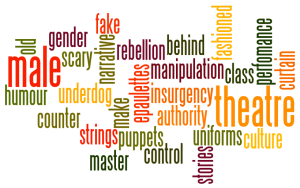This post has been written by Dr Karla Benske, a lecturer in GCU LEAD.
Since I will be missing this month’s Blended Learning Coffee Club, I thought that least I can do is let you all know why I love BoB (Box of Broadcasts). It is a subscription service and GCU is one of the many institutions in the UK who have subscribed to its service. I was introduced to BoB in early 2014 through a GCU Library presentation on BoB and what can I say? It was love at first sight. An archive that covers well over 60 different TV and Radio channels, including foreign language ones (mainly French and German), that allows subscribers to request and record programmes within 30 days of broadcast (up to 5 requests per day!) and that offers additional access to the BBC archive of programmes broadcast before BoB was born. On top of that, users can create clips from programmes to focus on one specific item or theme, rather than watching the whole programme. I find this particularly useful for the classroom, when there is not enough time to watch or listen to a lengthy broadcast. Please note: I am not terribly good at dealing with technical things, like using software to make a clip, but within BoB and, with a little bit of practice, it is actually very easy to do it. What is not to love about that?
BoB enables us as academics to embed programmes or clips into our teaching delivery, be it in the classroom or online. It therefore allows for a varied learning experience for students, complementing a lecture, seminar, or the preparation for class and/or an assessment. It captures or re-captures students’ attention and supports those with learning styles that prefer audio-visual to text-based information. Moreover, from an accessibility point of view, most television programmes have a transcript that runs parallel to the streaming, which is great, although this is not yet available for radio programmes.
Some may say, ‘Well, that sounds great, but how does that work?’ Firstly, to log on, all you need is to click on the login button, choose your institution and follow the instructions (for GCU staff/students it’s your GCU domain name and password). If your institution has not subscribed to the service, you won’t be able to access BoB, unfortunately. However, I would hope that it encourages you to suggest to the appropriate persons that a BoB subscription may be worthwhile for your institution. Secondly, an example: for the FAIR Curriculum workshop I use four clips from the film ‘Freedom Writers’ to frame the workshop and to:
- showcase how students might feel excluded;
- show a ‘hot moment’ in the classroom to encourage discussion;
- identify ways to engage disaffected students;
- to teach them to relate their personal experiences of discrimination to historical events and learn about the theories derived from researching specific historical events.

For me personally, the beauty of using these clips is that they demonstrate in different stages how we can use L&T approaches to make our teaching more inclusive and accessible. The fact that these are film clips also makes it more engaging and it triggers discussions, which I find, is any teacher’s dream come true.
Yes, some may argue that using a US film about a teacher and her students in a State High School in one of the most deprived areas of Los Angeles does not relate to anything we do here at GCU. That is a fair point. But what I am trying to showcase is not the context, but to encourage participants to discuss the teacher’s responses to the challenges she encounters and how her approaches enables all the students, regardless of their backgrounds and/or learning abilities to participate, aspire and achieve a High School education. In my view, such discussions open up space for ideas and for identifying solutions to the challenges that we face and it encourages us to reflect upon our teaching practice.
Another hobbyhorse of mine is listening to the radio and BoB gives me the opportunity to hold on to those snippets that grab one’s attention, but are gone within minutes. Here, like with the television programmes, it is the fact that now I can share these snippets that caught my attention and made me think about something for a little while after listening to the radio.
However, being in love also comes with some downsides, things one has to learn to accept and tolerate and BoB is no different. There are occasional hiccups, like the ‘programme unavailable to stream’ message, when you want to play something or a recording that has become stuck in recording mode. The former normally sorts itself out after a while or after a few retries, the latter can be resolved by contacting BoB by email. BoB’s FAQ section is very good and comprehensive and when I contact BoB by email, there is always a response within a short period of time. Another bugbear is the fact that, unfortunately, BoB is only available within the UK and will not allow the streaming of programmes outwith the country. So, we can’t use BoB for conference presentations, which I had hoped I could. And I don’t know how this affects internationally available online courses, although I would hope that a solution for the latter could be found. Why? Well, after participating in a number of MOOCs out of curiosity and to learn how others run online courses, I have to say that watching talking heads for weeks is not the most engaging way of learning and teaching and being able to incorporate clips of radio and television programmes is a way of breaking up this particular pattern of delivery without having to rely too much on YouTube and other means of embedding audio-visual material.
Overall, I am in love with BoB, despite the few setbacks I mentioned above. Only this morning, when logging on to BoB, I saw a recommended listing on the homepage that made me curious and after watching the programme for short while, I decided to make use of it. I would have never recorded it, but thanks to someone else who did, I had the fortune of finding yet another gem in BoB’s treasure trove for my learning and teaching practice. Another plus side of BoB is that you can search for other users’ playlists. Although the search for playlists is a bit clunky (you need to put in the exact name of the playlist), it allows for colleagues to share their lists and to see what other people have put together in relation to a specific topic. Feel free to search for and have a look at my (ever expanding) GCU_KHB_FAIR_Curriculum Playlist. BoB can be followed on Twitter @bufvc_bob, which is another way of keeping up with the latest, and how I came across a ‘World Autism Day Playlist’ that was shared by using the BoB Twitter feed. It also includes information on some of the hiccups as they happen.
Please do logon to BoB (for GCU staff/students: user domain and password) and explore it for yourself. It’s definitely worth it!





